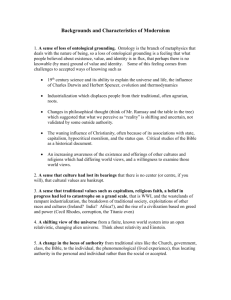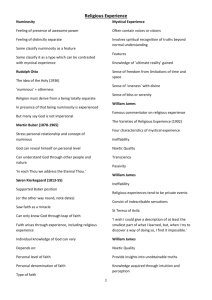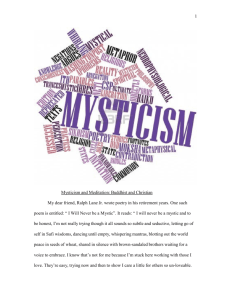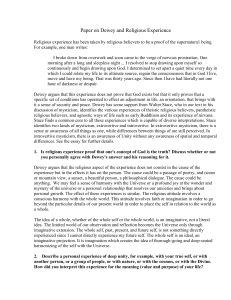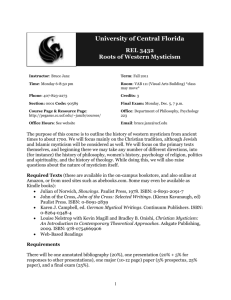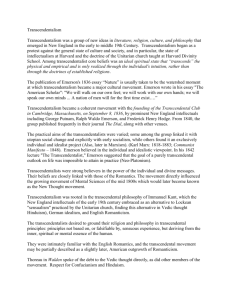Faith Misguided: Mysticism - Free Sunday School Lessons
advertisement
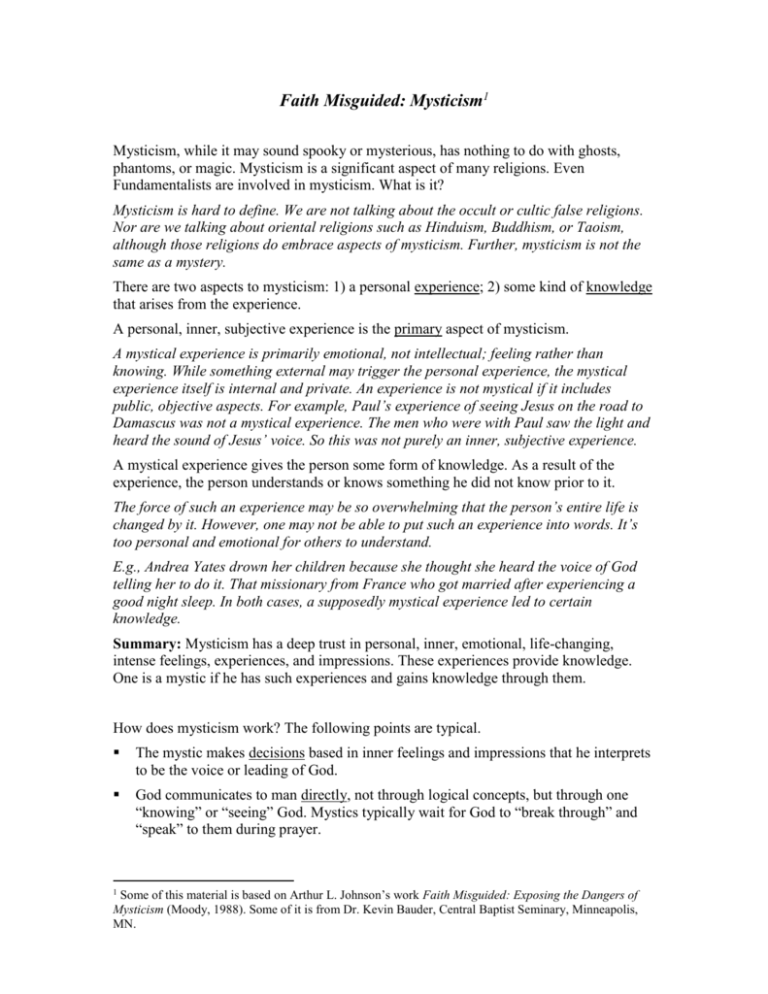
Faith Misguided: Mysticism1 Mysticism, while it may sound spooky or mysterious, has nothing to do with ghosts, phantoms, or magic. Mysticism is a significant aspect of many religions. Even Fundamentalists are involved in mysticism. What is it? Mysticism is hard to define. We are not talking about the occult or cultic false religions. Nor are we talking about oriental religions such as Hinduism, Buddhism, or Taoism, although those religions do embrace aspects of mysticism. Further, mysticism is not the same as a mystery. There are two aspects to mysticism: 1) a personal experience; 2) some kind of knowledge that arises from the experience. A personal, inner, subjective experience is the primary aspect of mysticism. A mystical experience is primarily emotional, not intellectual; feeling rather than knowing. While something external may trigger the personal experience, the mystical experience itself is internal and private. An experience is not mystical if it includes public, objective aspects. For example, Paul’s experience of seeing Jesus on the road to Damascus was not a mystical experience. The men who were with Paul saw the light and heard the sound of Jesus’ voice. So this was not purely an inner, subjective experience. A mystical experience gives the person some form of knowledge. As a result of the experience, the person understands or knows something he did not know prior to it. The force of such an experience may be so overwhelming that the person’s entire life is changed by it. However, one may not be able to put such an experience into words. It’s too personal and emotional for others to understand. E.g., Andrea Yates drown her children because she thought she heard the voice of God telling her to do it. That missionary from France who got married after experiencing a good night sleep. In both cases, a supposedly mystical experience led to certain knowledge. Summary: Mysticism has a deep trust in personal, inner, emotional, life-changing, intense feelings, experiences, and impressions. These experiences provide knowledge. One is a mystic if he has such experiences and gains knowledge through them. How does mysticism work? The following points are typical. The mystic makes decisions based in inner feelings and impressions that he interprets to be the voice or leading of God. God communicates to man directly, not through logical concepts, but through one “knowing” or “seeing” God. Mystics typically wait for God to “break through” and “speak” to them during prayer. Some of this material is based on Arthur L. Johnson’s work Faith Misguided: Exposing the Dangers of Mysticism (Moody, 1988). Some of it is from Dr. Kevin Bauder, Central Baptist Seminary, Minneapolis, MN. 1 Faith Misguided: Mysticism 2 The mystic is open to new revelation to be received internally, through feelings and impressions, rather than by Scripture. The mystic claims that God has revealed information to him. God (the Holy Spirit or Jesus) is the source of the experience. Illus.: Author and leadership guru John Maxwell tells the story of his Sunday school teacher telling him that God had revealed to him that John and several classmates would be preachers, and it happened that way. “Being spiritual” equals having inner impressions and feelings, and obeying them. The mystic claims to gain insight and knowledge through the experience that is unavailable through Scripture alone. Mystics find their experience so compelling that they are confident that what they learn through the experience is true. They “just know” without being able to say why and without being willing to discuss or defend their knowledge. Mystical experiences tend to be authoritative and not open to judgement or evaluation. The mystical experience convinces the mystic in such a way and to such a degree that he simply cannot doubt its value and the correctness of what he believes the experience “says.” Religion is primarily a matter of the feelings, not of the mind, and faith is an emotional state. One experiences and knows with his heart, not his head. Unfortunately, mysticism is alive and well within the ranks of Christianity. All theological positions within Christianity (i.e., Catholic, Orthodox, liberal, evangelical, fundamental) include mystics within them. What drives mysticism within Christianity? Why is it appealing? Many Christians are tired of stale, dry, unemotional worship. They long for a dynamic, exciting, personal, intimate relationship with God. They long to know that God is with them, that he cares for them, and that he has a message for them. They also desire an inner sense of peace and assurance that often accompanies mystical experiences. They want to be sure that God is really there–they want to feel God, to sense his presence in a tangible way. Mysticism gives them that assurance. What about Fundamentalist mysticism? What are some examples of the above points? “God told me…” “Let the Lord speak to your heart.” “Missing heaven by 18 inches.” “I knew the Lord wanted me to do this.” While mysticism may be appealing to some, there are many dangerous and unbiblical aspects of mysticism. The Dangers of Mysticism: 1. Mystics Test Truth by Inner, Subjective Impressions Rather than by Scripture, Logic, or Common Sense. Perhaps the greatest danger mysticism presents for Christians lies in the way mystics approach the Scriptures. For the mystic, one’s own inner emotional experiences become the test of truth rather than the Bible. The Bible and sound doctrine takes a back seat to experience. Faith Misguided: Mysticism 3 Those who believe they are receiving new revelation directly from God seldom expend the effort to properly interpret and apply biblical truth. In their hunger for powerful personal experiences, mystics are in peril of neglecting the proper use and interpretation of the Bible. What standard do we use to measure truth? An experience or the Word of God? The standard must be the Scriptures. How do we determine the content of our faith and the way that we practice our faith? Through experiences? No, through obedience to the Bible. The Bible is the final criterion of truth and the standard by which truth-claims are tested in all areas. If the Scriptures are complete, then the mystic’s claim to new revelation is invalid. All we need to know is already directly contained in the Word, is implied by what the Word says, or is revealed through general revelation. To claim further revelation is to deny the sufficiency and completeness of what has been given. Believing something to be so does not make it so. One does not mentally create truth. Truth is not private and subjective. Christians must bow to the truth contained in Scriptures, not the “truth” of an experience. Mystics are often beyond the reach of reason because they are convinced that their experiences are true. Mystical claims are impossible to evaluate. Mystics often make claims but refuse to defend them or even entertain the notion that their experience was not what they think it was. Christianity is a rational, logical faith. We are to love God with our minds (Mt 22:37). By revealing himself through the written Word, God has committed himself to using rational concepts as a tool for revelation, thereby making human reason absolutely necessary. God speaks to man’s mind through the Bible, not directly to his emotions. Understanding God’s Word may stimulate emotions, but God never bypasses the intellect to stimulate the emotions. Yet mysticism downplays rational thought and substitutes experiences and feelings as a tool for gaining knowledge. 2. The Christian Faith Becomes the Pursuit of New and Exciting Experiences. Mystics typically seek new and exciting experiences. How one feels becomes more important than what he believes or how he behaves. The goal becomes experiencing an emotional feeling rather than obedience or maturity. But the “high” of an emotional experience is temporary, leaving the individual longing for another experience. Mystical experiences can be manufactured and manipulated. Skilled speakers can influence a crowd to be receptive to various suggestions. If the crowd is expecting a certain experience, one can employ various methods to make it happen. Such experiences are actually just psychological mind games, not true supernatural events. It’s common for churches to create an atmosphere that is designed evoke an emotional response. A church may set a certain tone through music, art, sound, and even architecture in order to produce a religious feeling in those who attend. Faith Misguided: Mysticism 4 3. Mysticism Creates a False “Head-Verses-Heart” Distinction Mysticism draws a distinction between two kinds of so-called knowledge, “head knowledge” and “heart knowledge.” Mystics think there are two distinctly different kinds of knowing—intellectual and spiritual. Spiritual knowing has little to do with the mind or logic, but rather is a matter of the heart, that is, of the emotions or intuition. The Bible, however, knows nothing of this kind of non-intellectual knowing. When it speaks of knowing information, it means precisely that objective grasping of truth by the mind. Christians must not neglect this kind of knowledge as unimportant or unspiritual. Logic and rational thought are the necessary foundation for faith. The Bible does not separate the intellect from the emotions. Man is a unified, integrated creation, the combination of his intellect, emotion, and will. Thus to suggest that one “knows” something emotionally (heart knowledge) without also knowing it intellectually (head knowledge) is unbiblical. The truth of a claim must be settled by the use of rational means, not by considering how we “feel about it.” 2 4. Mysticism Allows for Logical Absurdity and Theological Error. Since experience takes precedence over logic, mystics commonly believe two contradictory ideas at the same time. The mystic can and often does hold totally contradictory positions. Mysticism blurs the line between truth and falsehood. For example, someone may stand up in a service and proclaim, “The Lord has told me that he wants our church to go forward with a building project.” The next person may stand and say, “The Lord has spoken to me. He does not want us to begin a building project.” The statements are contradictory, yet if each person had a mystical experience, both statements are considered to be valid. Mysticism makes people much more open to false teaching and error. Mystics tend to focus on the oneness of God, and thus question the doctrine of the Trinity. They often see God, and especially the Holy Spirit, as a force rather than a person. Because mystics are open to new revelation, they are also open to unorthodox and unbiblical ideas. Doctrine is secondary to experience. Mystics believe that experience is validating. That is, God must be pleased with anyone who has a (supposedly) supernatural experience. Also, common experiences tend to unify people of diverse and contradictory theological positions. For example, the Charismatic movement began in Protestant churches but spread to Roman Catholic churches even though there is much doctrinal disagreement between Protestants and Catholics. Doctrine doesn’t matter if you have an experience. 5. Mysticism Redefines Christianity. For mystics, the spiritual life is seen primarily in subjective, psychological terms rather than objective, behavioral ones. Religion is a feeling rather than a set of beliefs. Further, the goals of prayer, Bible reading, church attendance, and so forth, are thought to be personal, psychological satisfaction. In other words, the goal of the Christian life for a 2 This is not to suggest that the validity of the Bible’s truth claims be judged by the mind of man. Faith Misguided: Mysticism 5 mystic is self-centered rather than God-centered. The goal is enjoying an experience rather than glorifying God. However, the Scripture does not place the emphasis on our feelings, but rather on the truth and our recognition of, and assent to, that truth. The attention is not on the amount of faith we have, but on God’s faithfulness. The emphasis is not on our feelings about God but on our obedience to him. One is not spiritual just because he enjoys mystical experiences. Spirituality is not emotionalism. Biblical spirituality means to be under the control of the Holy Spirit to such an extent that maturity and holy living is the result. Not only is the spiritual life one of moral purity, but it also exhibits the fruit of the Spirit (Eph 5:9; Gal 5:22-23). To be under God’s control is to act in accord with his direction as given in his Word, all parts of our being functioning as he created them to function. This means that spiritual people seek all the necessary information, evaluating it according to the principles revealed in God’s Word, with a deep desire to know the truth. The decisions and judgments of spiritual people will be based on God’s Word, not their feelings. Their emotions will respond to the truth, motivating them to carry out the wise decisions that their Spiritcontrolled wills have made. The Antidote to mysticism: biblical rationality Rationality refers to the ability to understand and think according to the rules of logic. Christianity is based on the assertion that all knowledge of God begins with God’s revelation. The ultimate source of truth is God Himself. Since this is so, the standard by which truth is judged is God’s revelation. Therefore, if the result of human reasoning stands in opposition to the Bible, the results of such reasoning must be rejected. Rationality is not the same as rationalism. Rationalism puts its faith in the mind of man to figure all things out. Anything beyond reason is rejected, including the miraculous events described in the Bible. Rationality is simply the recognition that God communicates to man via his Word, and one understands the Word via his mind, not his “gut.” We are not suggesting an emotionless faith. If there is no feeling of joy, no sense of peace, no shame or sorrow for sin, no thankfulness for God’s great salvation, no wonder at God’s love, no humility and awe at the recognition of who God is, then it is doubtful that we understand God’s truths. However, emotion should be the result of understanding the truth of God’s Word, not the result of an impression or personal experience. When we make feelings the means of gaining knowledge, or when we make them a test of truth, or when we come to see them as the reality itself, then our emotions become misdirected. The rejection of mysticism is not the denial of proper emotions. Instead, it is the assertion that reason, not emotion, is the tool for grasping and testing truth. Valid Forms of Subjective Experience (Rom 8:14-17) We should recognize that some forms of personal or subjective communion can and should occur between God and the believing soul. This communion takes different shapes. Faith Misguided: Mysticism 6 (1) The inner witness of the Spirit: that internal testimony from the Spirit which persuades us of the truth of Scripture. “The Word will not find acceptance in men’s hearts before it is sealed by the inward testimony of the Spirit. The same Spirit, therefore, who has spoken through the mouths of the prophets must penetrate into our hearts to persuade us that they faithfully proclaim what had been divinely commanded.” (Calvin, Institutes, 1.7.4) (2) Illumination: the Spirit’s work that enables us to grasp the significance for the Scriptures for our own lives. Eph 1:18 The eyes of your understanding being enlightened; that ye may know what is the hope of his calling, and what the riches of the glory of his inheritance in the saints, (3) Assurance: The Spirit’s work within our spirit that produces assurance of salvation. How this is done we cannot fully understand, any more than we can understand the mode in which he produces any other effect in our mind. (4) The fruit of the Spirit: Feelings such as love, joy, peace, patience, gentleness, goodness, faith, humility and self-control may be the result of the Holy Spirit’s operation within the life of the believer. (5) Comfort: Since the Holy Spirit is the Comforter, we may sense this ministry from time to time. All of these constitute ways of knowing God personally and experientially, rather than merely abstractly. They do not involve the revelation of new truth in that they do not communicate anything to us that we didn’t know cognitively already. Hence, we would not call this kind of experience mystical. What does it mean to be “led by the Spirit”? Promptings/feeling/hunches/senses? No. See the contexts of Rom 8:14f and Gal 5:18f. The sense seems to be 1) confidence that you are truly saved because of the ministry of the HS in your life; 2) evidence of the fruit of the Spirit operative in your life; 3) it seems to be virtually synonymous with walking/living in the Spirit, which is essentially yieldedness to the HS, i.e., obedience. Being “led” is being submissive/obedient to God. There’s nothing in the contexts of “led by the Spirit” to suggest any direct revelation, promptings, feelings, senses, etc. Conclusion: Mysticism presents many grave dangers to biblical Christianity. It replaces the Bible with experience. It leaves one open to false teaching and irrational thinking. Dangers for Christians are magnified by the fact that we live in an age when mysticism is rapidly gaining favor in secular society. Because secular mysticism is popular, a Christianized mysticism is more attractive than is true Christianity to the world we are trying to reach. If we are to be effective in presenting a clear picture of the gospel, of the nature of our God and Father, and of his expectations for mankind, we must rid ourselves of this counterfeit spirituality that Satan has so subtly developed in the church. However, we must not “throw out the baby with the bath water.” The pious heart yearns for a close, personal, experiential relationship with God through Christ. But the mysticism as defined above is not the answer.
